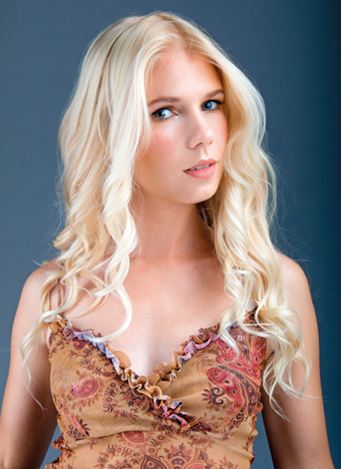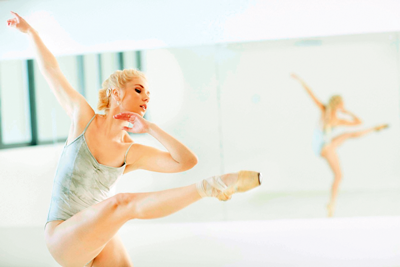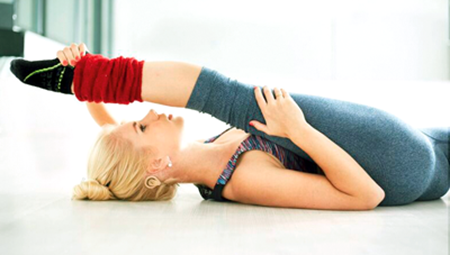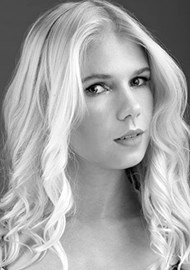In this article, Simone Botha Welgemoed shares deep insights on what it is like to have a profound hearing loss and cochlear implant as a professional ballet dancer and model, and the challenges she faced from childhood to get to where she is today. A must-read for every clinician and anyone involved in the arts in any capacity!

Simone Botha Welgemoed (Photo © JCB Photography).
Can you tell us a bit about your hearing loss and when it was diagnosed, and when you received your cochlear implant?
I was born with a profound bilateral sensory neural hearing loss. That means that I have more than 125dB hearing loss and that is over all measured frequencies. I was diagnosed in 1990, the week of my birth. I received my cochlear implant at age 22 months. At that stage I was the youngest child in Africa to be implanted. My deafness is caused by a defective genetic mutation, Connexion 26.
You are a Bovim ballet dancer and a model. Tell us about your career, how you got started and when you knew this is what you wanted to pursue.
I began with ballet classes at the tender age of two and did my first stage performance at the age of four. My professional ballet career really began when I was chosen to perform as a little angel in ‘The Nutcracker’ with Cape Town City Ballet, South Africa’s premier ballet company. I was only five years old and knew in that moment that I was in exactly the right place. My love and passion continued to grow stronger every year, despite the many obstacles I had to face.
“When performing in a group setting I am acutely aware of the dancers in the room. Their rhythm determines mine.”
My modelling career started at age nine and even though I didn’t realise it at the time, my mom saw it as an opportunity for me to learn the English language. Afrikaans is my home language and it is not very often that a profoundly hearing impaired child is able to execute two languages with the same ease. Some of the international corporate clients that I worked with often shared the same broken English and thus it created an environment in which I never felt judged if I made grammar or pronunciation mistakes. Furthermore, modelling created a platform for me to grow my confidence.
Was your hearing loss ever a deterrent or a concern for you pursuing your dreams?
It has never been a concern for me personally, but there were definitely others who didn’t share my vision. I have often been disappointed in people’s reactions to my career choice. Some talked behind my back and said that I would never be able to pursue a career in dance, because I cannot hear the music, but I have never been discouraged. In fact, it just made me more determined, because I realised I had something to prove.
“People often misunderstand my disability completely, thus the challenges that I face are different every day.”

Photo © Trevor Adeline Photography.
What challenges did you face and how did you overcome them?
I still face the same challenges that I faced as a child. They never disappear, you just get better at dealing with them. Having a hearing loss can often be a very frustrating disability as it can be completely invisible to people at times. I have had to work incredibly hard to fit into mainstream society and continuously need to prove that I am just as capable at fitting into the mould of what society claims to be the norm. In fact, I have actually never wanted to be the norm. I’ve always wanted to be better than that to prove that a hearing impaired person can be talented too. My parents raised me to be confident. They gave me the hope and courage to keep on improving myself and that little push carried me far.
Challenges that still arise today and that always will be there are challenges that are invisible to most. Social settings where the background is noisy or music might be playing even at normal levels and people are having a noisy conversation are a challenge. I mostly miss half of the conversations. It might look like I am following really well, but actually I only have a general idea of what the conversation is about. If you know me really well, then you will know I love to participate in conversation, so if I am a little quiet, it really just means I am lost. So yes, I do a lot of polite nodding!
Music will always remain a challenge, as it is too complex for me. I hear music overall, but I am unable to differentiate between instruments nor am I able to count music. Music often sounds horrible to me. The fewer instruments that are involved, the more I approve! So classical instrumental and piano music sounds beautiful to me. When it comes to performing to music I have many challenges to face. I find ways to adapt and most dancers and choreographers are unaware of this.
My sense of vision and touch along with my body rhythm and skill memory are the senses that guide me in my ability to perform in time with the music. In rehearsal a piece of choreography is rehearsed so many times that later on my body rhythm remembers how fast, slow, sharp etc. a movement has to be executed. So my body rhythm becomes the baseline of how I am guided to execute a piece in time with the music.
When performing in a group setting I am acutely aware of the dancers in the room. Their rhythm determines mine. I am sensitive to their way of moving and rely on them to be in time with the music. If they are delayed or move too quickly then I adapt, as they are my ears.
When I perform with a pas de deux partner then he takes charge. Through subtle cues and gestures, when I need it, I will speed up or slow down if need be. I especially need this when performing with a live orchestra as their rhythm and tempo is slightly different with every performance. During solo performances I ask a dance friend to stand in the wings of the stage, to make sure that I start my solo in time, reach the highlights in the music where the choreographer wants them, and end off in time.
I am often asked if my hearing is now cured. Sometimes I don’t know if that should be seen as a compliment or not. Yes, it is a compliment, because it shows how far I have come and how ‘normal’ I seem and how well I appear to be coping in society and at the workplace. On the other hand, it shows that people still don’t understand that I am profoundly deaf and that a cochlear implant is not something that cures you. Yes, I hear very well with it, but it also very much depends on the conditions for optimal hearing.
“I get to educate and change people’s view of a hearing disability one day at a time and that is enough for me.”

Photo © Trevor Adeline Photography.
Being a dancer requires you to move your body in many ways that also involve head movements such as pirouettes in ballet and even floor work in contemporary dance. That has proved a big obstacle in the past as my cochlear implant used to fly off my head. As a result, it would land on the floor and sometimes break. I have shed many tears over my broken cochlear implants that have had to be repaired constantly until my mom had a brainwave one day. We found that physioplaster was the solution. I stick the plaster between my ear and implant to keep it firmly in place against my head. So now I can leap, turn and fall as crazily as I want to and the cochlear implant is kept in place. It’s a small thing that people don’t even notice, but the struggle was real!
People often misunderstand my disability completely, thus the challenges that I face are different every day. All that it means is that I get to educate and change people’s view of a hearing disability one day at a time and that is enough for me.
Have you found the performing industry to be supportive of you?
Not always, but we don’t live in a perfect world and even though it would be nice if everybody could be equally understanding, they aren’t. I know it is mostly because they do not know me, or there is a lack of education or interest in the field of disability. People are often scared of something that they do not know. But I have had great support systems as well and have had the opportunity to work with many local and international choreographers and directors of dance companies as well as in corporate campaigns and film. I have been given amazing opportunities to perform lead principal roles in a few ballets. Bovim Ballet director, Sean Bovim, was the first to show how proud he was of me and to be excited to have me in his ballet company. On my first day there he immediately silenced the room and said to every dancer that they must please be aware that I cannot hear the music and that they must provide assistance if I need it. I knew then that I found a family in Bovim Ballet.
You received much attention globally due to the famous ad campaign where your CI was air-brushed out… were you surprised at the uproar this caused? Has this changed anything for you?
I knew that it might heat up a bit, but I must be honest that I didn’t expect it to spread so extensively onto a global scale. It wasn’t a nice experience to go through, but I am happy that it helped to raise awareness as it was clear to me that we need to educate society more.
“Many people will try to talk you down… Don’t mind them, but keep them in mind, because they are the ones to fuel you to work harder and to prove them wrong.”
I am still hoping that this will change the corporate industry a little more. We live in an imperfect world. Why don’t we see more models with unique characteristics? We need to show that the imperfect is beautiful too. I would love to work on a global campaign that visually speaks to our world audience.
What advice would you give to clinicians and those with HL who want to pursue a career in the performing arts?
A career in the performing arts is not for the faint hearted. You need to be willing to hustle and to prove yourself over and over. You need to stay connected and be a people person.
My childhood extra mural activities in ballet, modelling, drama and piano all formed important baseline tools that prepared me on my journey for this industry. You have to be prepared to work hard for what you believe in and know that it isn’t what you do once in a while that gets you anywhere, but what you do every single day. The discipline to set a goal and work towards it no matter what is what gets you through the tough times. And of course, make sure that you have a support system all the way, because many people will try to talk you down or won’t show you the kindness that you deserve. Don’t mind them, but keep them in mind, because they are the ones to fuel you to work harder and to prove them wrong. The thought, “Oh you don’t think I can? Just you wait and see,” has played many a time in my head.
So, my advice is to keep in mind that things never happen overnight. My speech ability didn’t happen overnight, but took years to master. Thus, give yourself a little break if you need it, but never ever give up.





